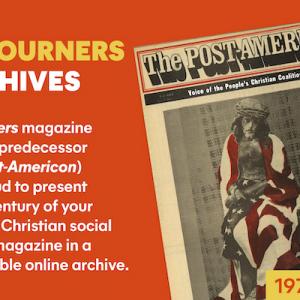Gordon Cosby was the founding minister of Washington, D.C.'s Church of the Saviour.
Posts By This Author
From the Archives: April 1977
NO LONGER do I have to separate myself from the victims of society, whether they are in prisons or mental institutions, or the economically poor, unable to buy time, health, space, leisure, education for their children, or a host of other things. I know myself to be victimized, because I am the victim of these powers. I can be at home with other victims.
And I need no longer to be bound by the hurt of ancient wounds in my own life because the penetrating light of Christ can pierce the darkness—the deepest darkness. And no longer need I fear the aging process. It has no destructive power over me. My diminishing powers and your diminishing powers in certain areas are the preparation for a new depth of communion with God, for which I was destined.
On the Potter's Wheel
What's it like to be almost human? Reflections on Jeremiah 18.
Mission: Possible
The Call To Community
Gordon Crosby is the founder and pastor of Church of the Saviour in Washington, D.C., and a Sojourners contributing editor. The following interview, conducted by Jim Wallis in May 1986, is the second in a series of interviews with Cosby. The first, which began our summer spirituality series, "The Life of Faith," appeared in the June 1986 issue; part three appears in the August/September 1986 issue.
Jim Wallis: In this spirituality series, "The Life of Faith," we began by talking about conversion and faith. I'd also like to hear your thoughts about community. How is community an expression of faith, and how does community nurture faith?
Gordon Cosby: The conversion experience brings one into a conscious relationship with Jesus, but at the same time it brings one into a conscious relationship with other people. When the conversion experience is a whole conversion experience, one is brought into a corporate reality and therefore, in some genuine, authentic sense, into community. If conversion to the gospel begins with individual praying, it becomes a matter of the person moving from that individualism into being part of a corporate entity. It's a long journey from individualism to being a "corporate" person, but a necessary one.
So you're saying that part of the call of the gospel itself is a call to a new community as well as to Christ.
That's right. You can't have one without the other. All of the images in the scriptures having to do with the church are corporate images—the people of God, the body of Christ. The person who says, "I want to belong to Jesus, but I don't want to belong to community," is saying that which is impossible from a biblical understanding of the church.
How is the community a crucible of conversion? How does continuing conversion occur in the context of community?
It seems to me that individualism is so strong in each one of us that we have to be converted step by step to get to the place where we really are corporate people. A community has to have different stages for that continuing conversion to occur. So you have exploratory steps, such as intern or novice membership.
Becoming a corporate person has to happen step by step because community is very, very frightening and extremely difficult. It is much more difficult than that new person realizes. Community is hell for many, many people—or an experience to be tolerated.
A Sermon on Power and Servanthood
I want to share with you several ideas that are extremely difficult to grasp and indescribably difficult to embody.




